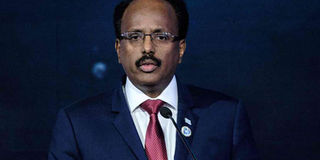US think tank tells off Somalia in maritime row

Somalia's President Mohamed Abdullahi Mohamed delivers a speech during the Sustainable Blue Economy Conference at KICC in Nairobi on November 26, 2018. Kenya and Somali are engaged in a maritime border row. PHOTO | YASUYOSHI CHIBA | AFP
What you need to know:
- AEI's generally pro-business stance often finds favour with Republican members of the US Congress as well as with the White House.
- ICJ began considering Somalia's claim on its maritime boundaries with Kenya after the breakdown of talks between the two countries.
A Washington think tank with influence inside the Trump administration is siding with Kenya in its maritime territorial row with Somalia.
In a blog post on Thursday, the American Enterprise Institute (AEI) said Somalia's government had “misplayed its hand” by deciding to auction oil and gas exploration blocks in Indian Ocean waters also claimed by Kenya.
The move by Somali President Mohamed Abdullahi Mohamed, also known as Farmajo, damages Somalia's “already-atrocious reputation for business climate”, wrote AEI resident scholar Michael Rubin.
“Nor does Somalia’s actions make sense while still dependent upon Amisom — and Kenya’s contribution to it — for basic security,” Mr Rubin added.
“The Somalia government should know that after decades of disaster, quick riches and short-term cash can come at a price too high to bear.”
MEDIATE
AEI's generally pro-business stance often finds favour with Republican members of the US Congress as well as with the White House.
President Mohamed has put his country in the position of seeming “to thumb its nose at the International Court of Justice process” that Somalia initiated in 2014, Mr Rubin said.
The Hague-based International Court of Justice began considering Somalia's claim on its maritime boundaries with Kenya after the breakdown of talks between the two countries concerning control of 100,000 square kilometres of sea bed.
“Farmajo may see oil as a means to rescue Somalia’s moribund economy, but production of oil absent capacity can actually make matters worse,” Mr Rubin observed.





